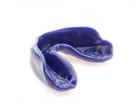 When people discover that they are grinding their teeth, they think that by getting a mouth-guard, it will stop the teeth from being damaged and cure the problem.
When people discover that they are grinding their teeth, they think that by getting a mouth-guard, it will stop the teeth from being damaged and cure the problem.
Unfortunately, the problem of teeth grinding goes a lot deeper than that and to solve it takes a lot more work, yes you may have saved your teeth but you are still going through the actions and this is doing untold damage to the joints of your jaws, your hearing, your sinuses, your neck and your upper back and to remedy all of these problems may take some serious corrective surgery in the future.
Critically, the main cause of grinding is stress and if you have a busy daily schedule in a city like Leeds, without knowing it, you may be getting very wound up and this is where you start clenching your teeth together. You will take this home with you and if you fail to unwind, you will take it to bed with you and it is when you sleep, that most of the damage is done. The first sign of a problem is if your jaws are aching in the morning, even clicking when you chew, but you may also feel tired because you are sleeping with stress and so when you go back to work, the process begins again, day after day.
Your dentist should also notice that you are wearing your teeth down- so you need to act fast. What you need is stress, maybe anger management in order to identify what is causing the problem and to get your daily frustration levels down.
But it doesn’t stop there because you need to learn how to unwind when you get home- whether it be by burning incense, soft music, a good book or by a long hot sensuous bath, anything to give you a good night’s sleep and that will help you leave your troubles where they belong- on the front doorstep.







